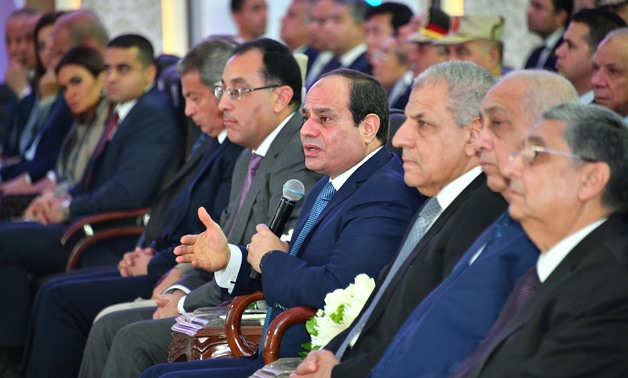
President Abdel Fatah al-Sisi gives a speech during the inauguration of national projects in some governorates via video conference on Monday, January 15, 2018 - Press photo
CAIRO - 15 January 2018: Egypt neither interferes nor conspires against any other country, said President Abdel Fatah al-Sisi in a press conference on Monday, amid tensions between Egypt, Ethiopia and Sudan.
“It (Egypt) adopts a steady policy of building, developing and constructing,” Sisi added in a speech during the inauguration of projects in some governorates via video conference on Monday. “All nations of the region are in need to move away from the policy of war and conflicts…Egypt will never fight against neighbors. We practice peace in attitudes towards and relations the others,” he affirmed.
In a message directed to Sudan and Ethiopia, President Sisi stated that Egypt’s developed military ability does not contradict with such the policy of peace, but it comes under defending national security. “Egypt has no time to waste on wars and conflicts.”
Egypt’s relations with Sudan were recently strained over the disputed border area of Halaib and Shalateen; on December 23, 2017, Sudan filed a complaint to the United Nations Secretariat, protesting a maritime border demarcation deal between Egypt and Saudi Arabia as the deal denotes the territory as Egyptian on the maps.
Halaib and Shalateen, or the Halaib Triangle, is an area of land measuring 20,580 square kilometers, located at the Egyptian-Sudanese border on the Red Sea coast. It is part of the Red Sea governorate and consists of three major towns – Halaib (which became a city in February 2014), Abu Ramad and Shalateen.
The area belongs to Egypt politically and administratively, but has been one of the major sticking points in Egyptian-Sudanese relations since the demarcation of borders between the two countries were carried out during the British occupation of Egypt in 1899, at a time when Sudan was part of the Egyptian Kingdom.
The issue reemerged after Halaib and Shalateen declared electoral constituency in both Sudan and Egypt in 2014.
On Saturday, Russia Today reported that the Sudanese ambassador to Cairo Abdel Mahmoud Abdel Halim, who has been withdrawn from Egypt for consultation, told Sudanese reporters that Khartoum “has taken tougher steps against Cairo and new development will take place in the coming few days and will be more violent.”
“We are at the beginning of our diplomatic process, which starts with summoning the ambassador for consultation and then withdrawing the ambassador…and third, dismissing the ambassador of the concerned country. Fourth, boycotting the diplomatic ties and fifth, declaring the war,” stated an Egyptian government official.
Three days ago, Ibrahim Mahmoud, the assistant to the Sudanese President, said that his country “faces (potential) military threats” from Egypt and Eritrea after claiming that there have been “military moves from Cairo and Asmara along the Sudanese eastern borders,” BBC reported. However, Eritrea has totally denied any Egyptian military moves, saying such remarks are “groundless.”
In a phone call to
Sabahak Masry talk show on MBC channel on Monday, Egyptian ambassador to Eritrea Yasser Hashem stated that Egypt has no military bases in Eritrea or any other country.
Regarding Egypt’s ties with Ethiopia, Egypt and Ethiopia have engaged in long negotiations over the controversial Grand Ethiopian Renaissance Dam (GERD). Egypt has voiced its concern over Ethiopia’s dam construction, which started in May 2011, as it would affect Egypt’s 55 billion cubic meter share of Nile water. However, Addis Ababa sees the dam is necessary for its development and would not negatively affect the downstream countries (Egypt and Sudan).
Tripartite meetings between Cairo, Khartoum, and Addis Ababa have been convened since 2014; the three countries signed a Declaration of Principle to reach a formula approved by the countries. They hired the French consultancy firms BRL and Artelia to consider the hydraulic studies and the flow of water during the water filling of GERD’s construction.
However, the three countries are still in disagreement over reports on the studies from the two companies. Egypt has asked for World Bank mediation and is waiting for other two countries’ response. Ethiopian Prime Minister Hailemariam Desalegn will arrive in Cairo on Wednesday in an official visit to discuss the Egypt-proposed mediation and other issues related to the dam.
The $4 billion dam is being constructed on the Nile with a capacity of 74 billion cubic meters, and is expected to generate up to 6,000 megawatts of power.
Additional reporting by

Comments
Leave a Comment